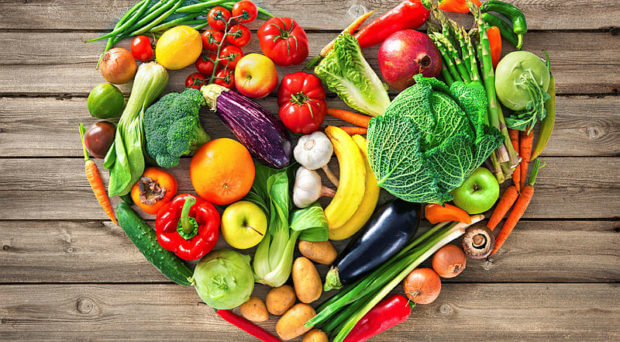
Whether you’re upping your gardening game or just want to reduce the waste you send to landfill, composting makes a lot of sense. Aside from being good for the environment, well-aged compost adds fertility to the soil and adds tilth: that crumbly, airy structure you get with a soil that contains plenty of organic material. Compost will eventually happen on its own if you just pile plant waste in a heap (that’s how things break down in nature, after all) but a few handy composting tips and hacks will make the process more efficient.
1) Stock Up on “Browns” Ahead of Time
A functional compost pile depends on lots of dry, high-carbon “brown” ingredients, including straw, grass clippings and dry leaves; and relatively small portions of high-nitrogen “green” ingredients, which include grass clippings, kitchen scraps and (paradoxically) coffee grounds and tea leaves. Which type do you think is harder to find all summer, during gardening season? Yup, “brown” ingredients.
This is important, because without lots of “brown” ingredients your compost will take longer to break down and will probably generate more unpleasant smells than it should. The trick is to secure your supply ahead of time. Got farms in your area? Buy bales of hay or straw. Got lots of trees? Bag and save your leaves, instead of having them hauled away in autumn. In a pinch you can even use fine sawdust and torn-up paper and cardboard (avoid anything with colored inks).
Read More: How Does Compost Affect Plant Growth?
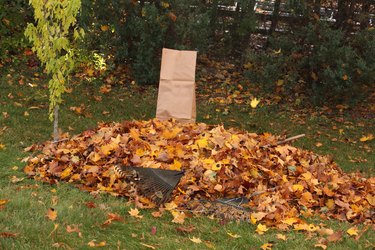
Instead of having them hauled away, save your leaves for next summer’s compost.Image Credit: Herman Bresser/Moment/GettyImages
2) Chop up Your Composting Materials
If you have an ice maker in your fridge, you know that crushed ice melts faster than cubes and cools your drink more quickly. As analogies go it’s a bit of a stretch, but the same rule applies in your compost pile. If you think about it, it makes perfect sense: a large tree takes years to break down, but sawdust only months. That means you can turbocharge your pile by simply chopping up the materials that go into the pile.
It doesn’t have to be labor-intensive: you can buy a simple shredder for your autumn leaves (which, by the way, makes them a lot easier to store for next year), or simply run a lawnmower over leaves, hay, straw and most other browns. Kitchen scraps can go into the food processor for a quick spin before you clean up from cooking with it. Egg shells can be dried for a few days and then crushed; or you can make them extra-brittle by toasting them for a few minutes in your oven first. If you already have a pile started, you can chop it in place with a compact tiller-cultivator. It’s an extra step, admittedly, but it’s a very effective shortcut on the road to perfect compost.
Read More: Homemade Compost Shredder
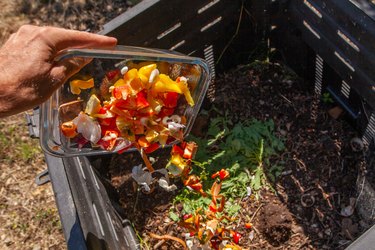
Kitchen scraps decompose much faster if they’re chopped small.Image Credit: Capelle.r/Moment/GettyImages
3) Aerate Your Compost Often
Most articles and authorities agree: you can have easy compost or you can have fast compost, but usually you need to compromise between the two. The complication here is aeration: running a fast compost pile you need to frequently agitate the compost to expose everything to air, but that requires work and therefore isn’t necessarily easy. That being said, there are a number of hacks you can use to keep effort low and results high.
One is to run a small tiller/cultivator over your compost every couple of weeks, which requires minimal effort but is very effective. If that’s still more work than you want to take on, consider layering your pile with tree branches, cornstalks or bamboo poles. They’ll let air in, and can just be pulled out before you use the compost. Perforated drain pipes do the same job even better. You could also put a wire mesh floor under your bin, letting air enter from below. Finally, if you really want to keep things simple, you could just buy one or two tumbling composters.
Read More: How to Accelerate Composting
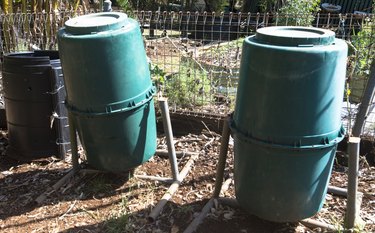
Tumbling bins aerate your compost with a simple spin.Image Credit: Toni Faint/Moment/GettyImages
4) Add Worms to Your Compost
One thing you’ll notice if you dig through a well-established compost pile is that it contains a lot of worms. The worms are attracted to your compost as a rich source of food, but they also help improve it: their digging aerates the pile, their eating breaks down the compost materials, and worm castings (their droppings) add fertility. There’s even a specialized form of composting with worms, called vermicomposting, that consists of not much more than worms, dirt and kitchen scraps in a plastic tote.
Worms will show up on their own in a compost pile that’s at ground level, but you can speed the process by “hiring” them yourself. You can buy red worms – the kind typically used in vermicomposting – from garden shops and online suppliers, or just make a point of collecting plain old earthworms whenever you find them (while digging, or after a good rain) and transferring them to your pile.
Read More: Worm Compost Barrel vs. Compost
Read More: How to Build a Worm Composter
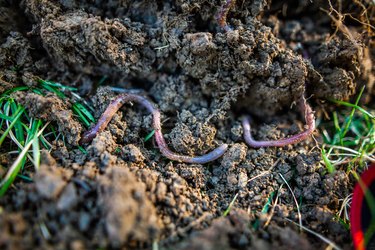
Adding worms to your compost will speed its development, and enrich the end product.Image Credit: Capelle.r/Moment/GettyImages
5) Save Some for Your Next Batch
Your compost is a whole ecosystem in itself, filled with a surprisingly complex community of worms, insects (and other creepy-crawlies), molds, bacteria and fungi. This builds on its own over time – it’s how nature works – but you can speed the process by adding a commercial compost starter (or inoculant), which contains a starter culture of these microorganisms and some nutrients to get them going. You could think of it as the compost equivalent of a probiotic supplement, or a sourdough starter.
The sourdough analogy is especially apt. Back in the day you could start by setting out dough to catch whatever wild yeasts were in the air (a from-scratch pile), or by acquiring some starter from a friend (an inoculant). Once you had a successful starter, you simply kept some back for each successive batch.
That’s exactly how compost works, too. Once you have that first batch made and matured, it will be naturally rich in all of the necessary microorganisms. Save a portion of the finished compost and add it to the new pile, and it will help kick-start your next batch.

Comments are closed